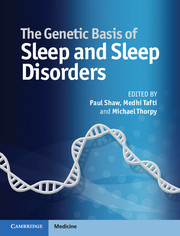Book contents
- The Genetic Basis of Sleep and Sleep Disorders
- The Genetic Basis of Sleep and Sleep Disorders
- Copyright page
- Contents
- Foreword
- Preface
- Contributors
- Abbreviations
- Section 1 Generalprinciples of genetics and genomics
- Chapter 1 Linkage and associations
- Chapter 2 Methods in complex trait analysis: mapping the genetic basis of sleep using model organisms
- Chapter 3 Genome-wide association study (GWAS) approaches to sleep phenotypes
- Section 2 Geneticsof sleep and circadian rhythms
- Section 3 Sleepphysiology and homeostasis
- Section 4 Insomnias
- Section 5 Narcolepsyand hypersomnias
- Section 6 Sleep-related breathing disorders
- Section 7 Circadian rhythm sleep disorders
- Section 8 Parasomniasand sleep-related movement disorders
- Section 9 Psychiatricand medical disorders
- Section 10 Medication effects
- Index
Chapter 3 - Genome-wide association study (GWAS) approaches to sleep phenotypes
from Section 1 - Generalprinciples of genetics and genomics
Published online by Cambridge University Press: 05 November 2013
- The Genetic Basis of Sleep and Sleep Disorders
- The Genetic Basis of Sleep and Sleep Disorders
- Copyright page
- Contents
- Foreword
- Preface
- Contributors
- Abbreviations
- Section 1 Generalprinciples of genetics and genomics
- Chapter 1 Linkage and associations
- Chapter 2 Methods in complex trait analysis: mapping the genetic basis of sleep using model organisms
- Chapter 3 Genome-wide association study (GWAS) approaches to sleep phenotypes
- Section 2 Geneticsof sleep and circadian rhythms
- Section 3 Sleepphysiology and homeostasis
- Section 4 Insomnias
- Section 5 Narcolepsyand hypersomnias
- Section 6 Sleep-related breathing disorders
- Section 7 Circadian rhythm sleep disorders
- Section 8 Parasomniasand sleep-related movement disorders
- Section 9 Psychiatricand medical disorders
- Section 10 Medication effects
- Index
Summary
- Type
- Chapter
- Information
- The Genetic Basis of Sleep and Sleep Disorders , pp. 22 - 32Publisher: Cambridge University PressPrint publication year: 2013



